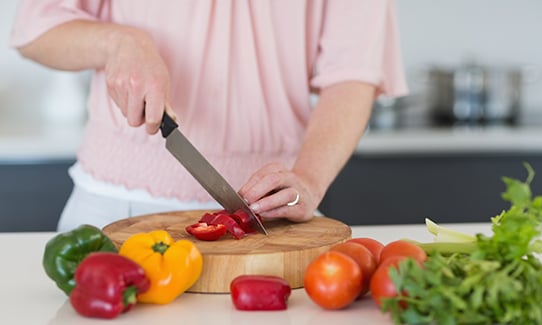

Sep 24 2025
Fueling Hope: Eating to Fight Breast Cancer


Summary
A healthy diet with whole foods, antioxidants and low sugar can reduce breast cancer risk, support recovery. Avoid alcohol, highly processed foods. Recipes included.
Breast cancer will impact one in 8 U.S. women during their lifetimes.
Good nutrition doesn’t replace annual screening for early detection or medical treatment if
breast cancer is found. But a healthy diet can help to reduce your risk of developing breast
cancer and fuel your recovery if you are diagnosed.
Eating to Reduce Your Risk
The science of nutrition continues to evolve. We know that diets high in processed foods and/or
high in sugar are associated with overall increased incidence of cancer. Long-lasting
inflammation can harm your cells and weaken your immune system, which increases the risk of
cancer, especially breast and prostate cancer.
Choosing whole foods high in protein and low in sugar content, along with restricting highly
processed foods and seed oils, may help to decrease breast cancer risk, primarily by lowering
the overall inflammatory response.
Antioxidants support the immune system and fight inflammation. They can be found in:
- Fatty fish such as salmon, tuna, sardines, anchovies and other cold-water fish
- How much: Eat at least 3-4 ounces, twice a week.
- Fruits and veggies like berries, spinach, kale, broccoli and tomatoes
- Focus on a variety of color
- How much: Eat at least 1.5-2 cups of fruit and 2-3 cups of veggies per meal, at
least 5-6 cups each per day.
- Nuts or seeds like walnuts, pine nuts, pistachios and almonds
- How much: Eat 1.5 ounces daily, about one handful.
- Beans like pinto, black, red kidney and garbanzo beans
- How much: Eat at least 1 cup, twice a week.
- Olive oil contains heart-healthy monounsaturated fats
- Choose extra virgin olive oil packed in dark bottles.
- How much: Use 2-3 tbsp/day in cooking or salad dressings.
Limit inflammatory foods including:
- Fried foods
- Soda
- Refined or highly processed carbs and sweets like white breads, pastries and candy
- Lard/Butter – high in saturated fats
- Processed meats such as deli meat, smoked, cured, added flavor, bologna, sausage, etc.
- Omega-6 fatty acids, including oils such as corn, safflower, sunflower, soy, peanut and
vegetable
Avoid Alcohol
The American Cancer Society reports that one drink a day increases the risk of breast cancer by
7-10%. That risk increases for each drink consumed daily. A woman who has two or three
alcoholic drinks a day has a 20% higher risk than nondrinkers.
Eating to Fuel Treatment & Recovery
Good nutrition is essential to supporting your body during treatment and recovery. The goal is
to boost your immune system both for short-term healing and long-term recovery. In addition
to avoiding alcohol and inflammatory foods like those listed above, consider adding these super-
charged foods.
Colorful Vegetables & Plant-Based Foods
- Cruciferous vegetables such as broccoli, Brussels sprouts, kale and cauliflower contain
compounds like sulforaphane that may protect cells. - Leafy greens like spinach, Swiss chard and collard greens are rich in antioxidants and
folate. - Tomatoes, carrots and sweet potatoes are high in carotenoids, linked with reduced
breast cancer risk. - Legumes including lentils, beans and chickpeas provide fiber and plant protein.
Fruits
- Berries including blueberries, strawberries and blackberries are packed with antioxidants.
- Citrus fruits like oranges, lemons and limes provide vitamin C and flavonoids.
- Apples, pears and plums contain polyphenols with anti-cancer properties.
Whole Grains & Fiber
- Oats, brown rice, quinoa and whole wheat help regulate hormones (binds estrogen) and support gut health by removing inflammatory properties.
- Goal: 25-30g a day
Healthy Fats
- Nuts and seeds including walnuts, flaxseeds and chia seeds are rich in omega-3s & lignans, which may reduce tumor growth.
- Olive oil and avocado are heart-healthy fats with anti-inflammatory effects.
- Fatty fish such as salmon, sardines and mackerel are rich in omega-3 fatty acids and may slow cancer cell growth.
Beneficial Beverages & Spices
- Green tea contains catechins that may slow cancer spread.
- Turmeric with black pepper is anti-inflammatory and antioxidant.
- Ginger and garlic may reduce inflammation and boost immune defense.
- Soy is safe in moderate amounts (1-2 servings/day) – edamame, tofu or soy milk.
Recipes
Try these pink-powered recipes inspired by breast cancer awareness to incorporate more
healthy foods into your everyday routine.
Pink Power Smoothie Bowl
Ingredients:
- 1 cup frozen raspberries (antioxidant-rich)
- ½ cup frozen strawberries (vitamin C + fiber)
- ½ small beet, cooked or raw (supports detox pathways)
- ½ cup unsweetened almond milk (or oat milk)
- ½ cup plain Greek yogurt (protein + probiotics; can use non-dairy if preferred)
- 1 Tbsp ground flaxseeds (fiber + omega-3s, helpful for hormone balance)
- 1 tsp fresh grated ginger (anti-inflammatory)
Directions: Blend + serve chilled
Watermelon & Berry Refresher
Ingredients:
- 2 cups watermelon chunks (hydrating)
- 1 cup strawberries (antioxidants)
- Juice of ½ lime
- Fresh mint leaves
Directions: Blend + serve chilled
Pink Quinoa Salad
Ingredients:
- 1 cup cooked quinoa (fiber + antioxidants)
- 1 small roasted beet, diced (antioxidants)
- ½ cup pomegranate seeds (antioxidants)
- ½ cup diced strawberries (antioxidants)
- 2 Tbsp chopped walnuts (fiber + antioxidants)
- Handful of baby spinach or arugula (fiber + antioxidants)
- Dressing: 2 Tbsp olive oil + 1 Tbsp lemon juice + pinch of salt & pepper (omega-3s)
Directions: combine well + serve chilled
Strawberry Chia Pudding
Ingredients:
- 1 cup unsweetened almond milk
- 3 Tbsp chia seeds
- ½ cup blended strawberries (fresh or frozen)
- ½ tsp vanilla extract
Directions: Mix everything, let sit overnight in fridge. Top with sliced strawberries or
raspberries.
Pink Berry Yogurt Parfait
Ingredients:
- Layers of plain Greek yogurt (gut promoting probiotics)
- Mashed Raspberry puree swirled in (antioxidants)
- Oats or granola for crunch (fiber + enjoyment)
- Fresh berries + a sprinkle of flax or chia seeds (fiber + omega-3 source)
Directions: Layer ingredients. Enjoy immediately or refrigerate for later.


Emily Littlejohn, MS, RD, LD
Emily Littlejohn, MS, RD, LD, is a registered dietitian with NMMC’s Population Health Department. Emily holds bachelor’s and master’s degrees in food and nutrition services from the University of Mississippi. She offers nutrition counseling by appointment at the NMMC Wellness Center in Tupelo. Call (662) 377-7803 for more information.
Nutrition plays a key role in health, healing and living a well-balanced life. Whether you need support for special dietary concerns or simply want to eat more healthfully, we can help.
Call (662) 377-7803 to request nutrition counseling.

Subscribe to Our Newsletter
Like this content and want to get more? Sign up for True North, the health and wellness newsletter from North Mississippi Health Services!

Subscribe to Our Newsletter
Like this content and want to get more? Sign up for True North, the health and wellness newsletter from North Mississippi Health Services!

Nurse Link®
Not sure if you need Urgent Care or the ER? Call 1-800-882-6274 anytime to speak directly to a registered nurse and get immediate answers. Using computerized medical protocols, nurses direct callers to the most appropriate treatment. Our nurses are available 24 hours per day, seven days per week.